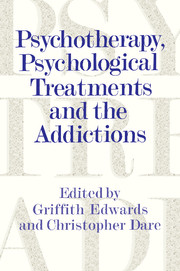Book contents
- Frontmatter
- Contents
- List of contributors
- Psychotherapy and psychological treatments of substance problems: generalism, specialism and the building of bridges
- Acknowledgements
- Part one Backgrounds to therapeutic understanding
- Part two Treatments
- 5 Psychotherapy: why do some need more and some need less?
- 6 Addictive behaviour: the next clinic appointment
- 7 Advances in families and couples therapy
- 8 Solution focused brief therapy: a co-operative approach to work with clients
- 9 Recent developments in cognitive and behavioural therapies
- 10 Cognitive and behavioural treatments for substance misuse
- 11 Motivational issues in the treatment of addictive behaviour
- 12 Can ‘stages of change’ provide guidance in the treatment of addictions? A critical examination of Prochaska and DiClemente's model
- 13 Group therapy and the addictions
- 14 Alcoholics Anonymous as mirror held up to nature
- 15 How therapeutic communities work
- Part three Postscript
- Index
14 - Alcoholics Anonymous as mirror held up to nature
from Part two - Treatments
Published online by Cambridge University Press: 05 August 2016
- Frontmatter
- Contents
- List of contributors
- Psychotherapy and psychological treatments of substance problems: generalism, specialism and the building of bridges
- Acknowledgements
- Part one Backgrounds to therapeutic understanding
- Part two Treatments
- 5 Psychotherapy: why do some need more and some need less?
- 6 Addictive behaviour: the next clinic appointment
- 7 Advances in families and couples therapy
- 8 Solution focused brief therapy: a co-operative approach to work with clients
- 9 Recent developments in cognitive and behavioural therapies
- 10 Cognitive and behavioural treatments for substance misuse
- 11 Motivational issues in the treatment of addictive behaviour
- 12 Can ‘stages of change’ provide guidance in the treatment of addictions? A critical examination of Prochaska and DiClemente's model
- 13 Group therapy and the addictions
- 14 Alcoholics Anonymous as mirror held up to nature
- 15 How therapeutic communities work
- Part three Postscript
- Index
Summary
Introduction
A drinking problem is in its essence a feeling and behaviour towards oneself and other people, which is embedded in the drinker's personal history and situated within the nexus of a total, complex, personal present. Recovery, when it begins to arrive, will be based on the individual's own sense of possibilities for change and movement within that subjective and objective, constraining and enabling, historically and contemporarily determined reality. Recovery can be assisted by the therapist, but cannot be dictated by any professional outsider. The role of therapy is best considered as that of supporting a natural potential for recovery by perhaps a timely nudge, lending some hope, explaining techniques for self-management, or given a warning of blind alleys.
That perspective was articulated by Orford and Edwards (1977) in the following terms:
The influences, whether non-specific or specific, which go under the heading of ‘treatment’ do not impinge on an individual who is isolated from all other influences. On the contrary, treatment or advice should be seen as elements added to, and inter-reacting with, a continuously evolving field of what might be termed natural influences… Therapy may not in itself be a particularly powerful force, but if we understand the natural balance of forces, the balance may be favourably tipped.
That is not a denigratory, nihilistic view of treatment, but it differs radically from the concept of any single favoured intervention as sovereign and specific remedy, a master stroke to be prescribed for the patient who is the passive recipient of a powerful medicine.
The argument that sees the understanding of ‘natural healing processes’ as the best foundation for treatment of drinking problems has been further developed by Vaillant (1980), with empirical support from his own longitudinal research (Vaillant, 1983). Of particular relevance to the concerns of the present chapter is the suggestion made by Vaillant (1980) that AA may contain within it important elements of what studies of the drinker's career reveal as being the possible levers or processes that effect change in drinking and life course over the longer term:
The success of Alcoholics Anonymous and its facsimiles … is probably due to the fact that it conforms so well to the natural healing principles.
- Type
- Chapter
- Information
- Psychotherapy, Psychological Treatments and the Addictions , pp. 220 - 239Publisher: Cambridge University PressPrint publication year: 1996
- 5
- Cited by



